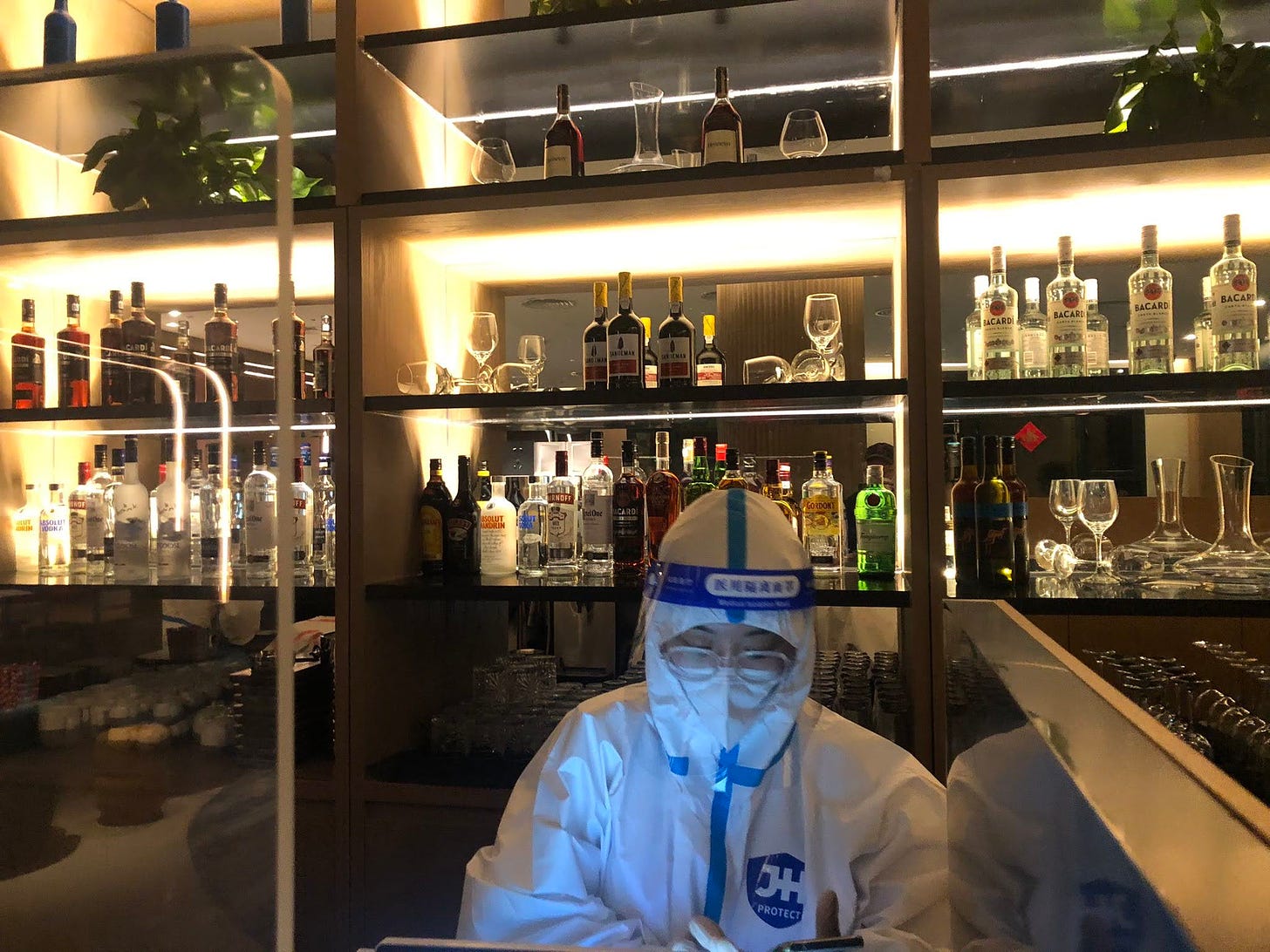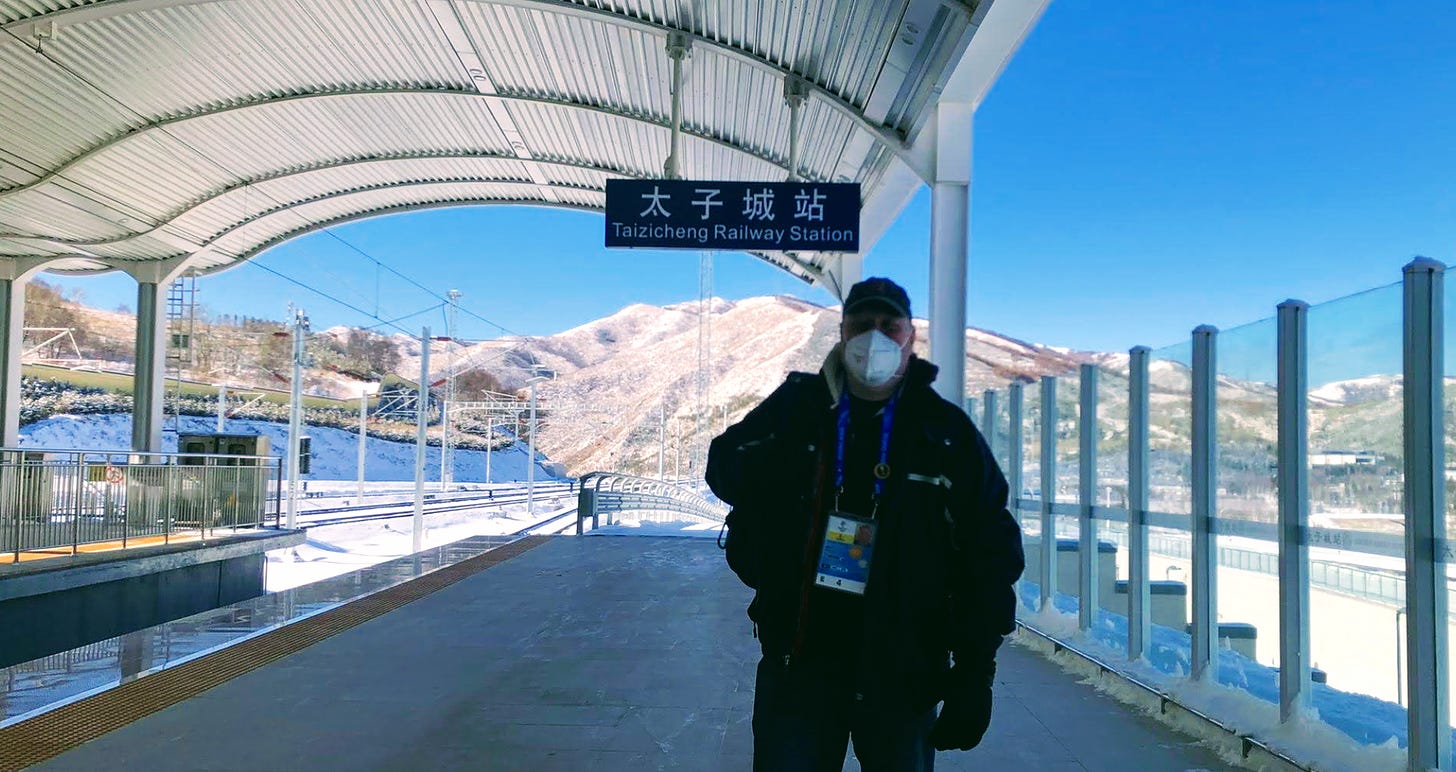Putting a bow on Beijing
Wrapping up the Beijing Olympics, the greatest assignment I never want to experience again
Hey, we’re back! It’s been a long couple months preparing for, and then surviving, the Beijing Olympics. But we’re through it now, and as the weather warms to temperatures 100 degrees higher than the windy slopes above Zhangjiakou, I’m going to put a final bow on the strangest, toughest assignment of my career. The work’s over at Yahoo; here’s the behind-the-scenes of how it all went down.
If this is your first visit here, welcome. This is Flashlight & A Biscuit, my (usually) Southern culture offshoot of my work at Yahoo Sports. If you enjoy this, why not subscribe? It’s free and all. Now … relax.
I will never hear the word “relax” the same way again.
Do this: tilt your head straight up. Now imagine someone in a hazmat suit standing over you, looming in your field of vision, jabbing a swab straight down into your nasal cavity. Now, imagine that swab hitting resistance — and then getting jabbed further and further inward, so invasive a kidney removal would seem gentle in comparison. All the while, the nurse — or, hell, maybe she isn’t even a nurse, just a freelance sadist — is saying “Relax,” in a voice as soothing and comforting as an axe dragged slowly across concrete.
Yeah. Welcome to China, mothereffer.
Let’s back up a moment. Covering the Olympics is a high-water mark for journalists — it’s the Olympics of sportswriting, if you will — but it’s also an Olympian, pun very much intended, test of one’s willpower, body and psyche. You’re in a foreign country for three weeks, writing about unfamiliar sports and trying to keep up with a constantly-changing situation on the ground for the audience back home. It’s like covering five Super Bowls at once.
But it can also be exhilarating in a way no other assignment is. Millions of people tune into the Olympics every night — not as many millions as in years past, true, but millions all the same — and there are both easy morality plays (Russia: bad! Team USA: good!) and more nuanced questions (How do we handle athletes who are struggling with their mental health? Should athletes protest injustice in a country hostile to dissent … or should athletes even protest at all?). Plus, in normal years, you get to cross paths with people and cultures from all over the world, and throw yourself into environments you’ve never seen before and will never see again. It’s glorious … in normal years.
This time around, China decided to go ahead with the Olympics in the midst of a two-year-old pandemic. The reasons for this are many and varied and beyond the scope of this particular little column, but it boils down to this: the 2022 Olympics were always going to be China’s grand flex on the world stage, and not even a global pandemic was going to slow that locomotive.
So China invited the Western world in — well, athletes and journalists, at least — but only on the condition that we absolutely, thoroughly sanitize ourselves. That meant a several-week lockdown prior to the Games; the last thing you wanted was to get on a plane, test positive in China, and end up in a Chinese “isolation facility.” So while the rest of the country was shedding masks and gathering in restaurants, I was locked down in my house like it was March 2020 all over again. And this time, no “Tiger King” to get me through. (Strong recommend on “Peacemaker,” though.)
Then, prior to even boarding our planes, we had to take two lab tests within 96 and 72 hours of our flights — getting those turned around in time was a fun challenge at the height of Omicron — and said tests could only be at facilities approved by the Chinese government. In the entire state of Georgia, there were exactly two (2) such facilities.
After submitting enough personal and health data that China could be, and probably is, growing a clone of me in some lab, I arrived in Beijing bleary and unfocused. It was two calendar days after I’d left Atlanta, at the tail end of a 30-hour journey, and I found myself facing the first of the omnipresent hazmat-suited Chinese guard-attendant-helper warriors that I’d encounter over the next three weeks.
He (?) silently pointed down the hall of an empty terminal, and friend, when the world’s second-busiest airport is utterly silent, without even any ambient music, it shakes you. We made “so this is Act 2 of the disaster movie, right?” jokes to keep the nerves at bay, and told ourselves they were just jokes.
That feeling you’re being watched
Security prep for China involved a whole lot of protective measures, including burner phones and laptops. Once there, we were under constant surveillance, and I do mean constant. I played a little game with myself when wandering around, trying to see how long it took me to count 10 cameras pointed at me. I usually hit 10 in seconds, and that’s just the ones I could spot.
China’s human rights violations, both alleged and documented, were very much on the mind (and keyboards) of Western journalists. Athletes were advised to hold their tongues, and almost all did. (The only real breach of the Olympics’ “no-politics” edict came from a Chinese official who dismissed all criticisms of China’s human rights record as “lies.”) And whenever the questions during the daily International Olympic Committee briefing struck a little too close to home, moderators would call on a Chinese journalist who’d ask a gentle, deflating question, like the difficulty of finding Bing Dwen Dwen mascot dolls, or why the color red was important to the Games. The official narrative remained intact, at least inside China.
Throughout our time in Beijing, we all carried a personal tracker around our necks in the form of our Olympics ID. Pass through a gate, and your picture would show up on a huge nearby screen. Go past a thermal sensor, and your body temperature would pop up next to an infrared image of you. Going to go way out on a limb here to say I was not a fan.
Though if the Chinese were in fact tracking my communications, they ended up with a whole lot of photos of the family beagle from back home, along with meticulous documentations of his bowel movements. Do with that what you will, China.

Turns out they serve Chinese food in China
One of the true joys of international travel is experiencing the cuisine of far-off locales. This time around, I got to experience the hotel buffets of far-off locales.
Knowing they were catering to Westerners, the buffets offered plenty of fare both recognizable to, and digestible by, Western palates. The descriptions were always worth reading (“French bacon steak” was one of my favorites — it was just bacon), and the food was almost universally good in a restaurant-buffet kind of way. I was housing custard and pork baos by the end of the trip, and I’ll dream of a bowl of noodles and beef that I got from a noodle station for quite awhile. It wasn’t five-star cuisine, but it was a damn sight better than egg discs and watery-syrup insta-waffles at a highway-exit Best Western.
As for the venues, though … well, that was a different story. There, we had an assortment of snacks (I did a full daily rundown over on Twitter), plus the occasional “hot meat sandwich” (ham and cheese in a heavily microwaved croissant) or “Western noodle box” (spaghetti and ketchup). It would’ve been fine except there was the same assortment of snacks at every venue, every day. Sometimes they’d splurge and put out a pile of Snickers that’d get devoured by certain Western journalists like an unattended bowl of candy at Halloween. (We’re all trying to figure out who did this.)
But by far the best item, pound for pound (or ounce for ounce) was the spicy ramen noodle bowls — just add a bit of strip-off-your-flesh hot water, and bang, lung-searing goodness. Coming off a minus-10 degree mountain, it was seriously some of the best food I’ve ever eaten in that moment … and I stretched out that moment as long as I could, since our Chinese watchpeople didn’t make you wear masks between bites.
“Please gather your belongs and get off the bus”
The only real way we got to see Beijing was through the windows of shuttle buses. So, so, so many shuttle buses, every one with a sweet feminine voice that intoned the above declaration at every stop. I’m not going to render any snap behind-the-glass judgments on Beijing or its people except to say that there’s some fascinating architecture that reminds you you’re not in the West any longer, temples and architectural shapes that don’t line up with our own experience.
The shuttle buses were where we crossed paths with most of our fellow travelers. Most times, everyone rode in silence, but every so often, you struck up a memorable conversation or two. An Italian journalist noticed the A on my baseball cap and said, proudly, “Los Angeles Angels.” I told him, no, Alabama, and he brightened and crowed “Alabama! Crimson Tide!” in a melodious Italian accent.
Turns out my new Italian friend, whose name is Giacomo, had an expansive knowledge of American sports, particularly football. His favorite team was the Peetsburgh Steelers. He liked Ben RoethlisBORger. When I told Giacomo I was from Atlanta, he shook his head sadly and said, “Matt Ryan. No good.” Then he brightened, pointed at me and fist-pumped. “Hawks! Trae Young!” Giacomo made a whole lot more sense than a lot of lifelong American sports fans, is what I’m saying.
The volunteers, making the best of a terrible situation
COVID prevention rules inside the “closed loop” were, to put it mildly, ridiculous and absurd. We wore masks everywhere — inside, obviously, but also outside, with no one anywhere close by. And these weren’t the cute little cloth Baby Yoda masks either, these were the big-dog N95 jobs that, in fact, do cause a little trouble breathing when you’re laboring at high altitudes. All around us, hazmat-suited workers sprayed down everything — parking lots, bus tires, ceilings, elevator buttons — in a sterling performance of Hygiene Theater. Three weeks of that, and even the most sanctimonious masks-everywhere Twitter epidemiologist would turn into a free-the-children anti-mask school-board-meeting screamer.
Those hazmat-suited volunteers lent an apocalyptic air to the entire Games … until you got up close, that is. Then they were all smiles … well, I assume they were smiling, I couldn’t see. But their body language sure seemed like that of people who were happy to see us.
Granted, it’s impossible to really relax when even your goddamn bartender is mixing drinks in a hazmat suit. But the volunteers really did do their best to be welcoming and friendly. Yes, this, like everything else in China, was a well-orchestrated propaganda operation. But in this case, you can’t blame the people for their government.
One interesting little tidbit: the Super Bowl halftime show was taking place about 8:30 a.m. Monday morning, right as I was walking into the media center up on the mountain. I managed to find a way to tap into a Super Bowl feed. So while “Still D.R.E.” was pumping through my headphones, I looked around and saw volunteers looking at their own phones, their heads bobbing in time. It’s illegal to get feeds of Western videos in China, but leave it to the youth to figure a way to keep their heads ringing.
How the Olympic sausage gets made
There’s an art to Olympic journalism, but more importantly, there’s a craft to it. The saving grace of the Olympics is that for three weeks, you have literally nothing to focus on but your work. (This was doubly so this time around, when I was cut off from my email account and phone because of security concerns. Not a great idea to log into your bank from the public wifi of a hostile nation.) You wake up, you write, you get on the shuttle bus, you write, you go to a venue, you write, you take another shuttle bus back, you write, you get back to your room, you write. Without the option to go seek out any nightlife in China, the writing became everything.
Back when I covered the Games in South Korea in 2018, I wrote 44 articles. I wanted to beat that, and thanks to Beijing’s closed loop, I blew right past it, writing about 70 stories. Now, when you’re writing 70 stories in three weeks, they’re not all going to be works of genius. And without the ability to get off the grid and wander around unmonitored territory, there was no way I was going to get the 2022 version of my infamous Penis Statues story. Whether that’s a net benefit or not is up to you.
Anyway, here’s a couple of my stories that hold up more than a few hours after they were published:
The Kamila Valieva saga: I was in the arena the night Kamila Valieva, the 15-year-old Russian skater, crumbled under the weight of her own country’s expectations and the rest of the world’s scorn. I wrote a gamer — industry parlance for the first story that comes right after the end of an event, even though this one could’ve been called a “rinker,” I guess — and then had that rarest of opportunities: a couple hours to work on a single story and build out a narrative and some scene. The result was pretty solid, at least according to everyone who wasn’t a Russian state-media propagandist gleefully ripping my American hypocrisy.
Shaun White, snowboarding GOAT: For most sportswriters, you can drop us off at any event and we can find our way around pretty quickly — where’s the locker room, where’s the press box, where’s the snacks, we’re good. There’s a level of institutional knowledge already in your bones, so that you aren’t saying things like, “Wait, there’s a Georgia and a Georgia Tech? When did that happen?”
At the Olympics, with very rare exception, we’re all learning about new sports, new athletes and new techniques on the fly. (“New” to us, that is.) God bless the patient press officers from the respective sports, who put up with our idiot Sports Genius Takes, like asking why skaters can’t just do a whole ton of those triple-spin things, or why curlers don’t just bash the hell out of every stone every time they sling it. (Imagine some foreign journalist coming and asking why NFL teams don’t just send out 25 men on defense, or throw the ball into the end zone on every single play.)
So you cannot go into an Olympic Games unprepared. And you cannot go into an Olympic Games with an ego. You have to admit when you don’t know shit about shit, and when it came to snowboarding, I didn’t even know what shit I didn’t know. Which was bad news, because men’s snowboarding is undergoing a primal revolution right now.
Coming into the Olympics, the talk of the snowboarding world was whether anyone would even attempt a triple cork — three diagonal flips — in competition. The first one had only been landed late last year, and nobody had ever won with one in their arsenal (it’s a tough trick to use in sequence because it’s so difficult to pair with other tricks — you can’t just do one and be done with it, that’s not enough for a full run). So I got snowboarding experts to explain to me, in what to them must have been incredibly childlike detail, what exactly a triple cork was, and why it was so difficult. Here’s that prelim story.
Fortunately, it all paid off; Japan’s Ayumu Hirano threw down a triple cork en route to winning the gold, and Shaun White, recognizing that the sport he once ruled had at last passed him by, finished in fourth place. It was my favorite moment of the entire Games, and here’s what I wrote afterward.
Because here’s the thing about the Olympics: I know everyone complains about how they don’t like the sports, they’re boring, nobody cares, et cetera. And I get that, if all you’re focused on is the competition itself. To me, though, the Olympics are about so much more than the winner. The Olympics are about the people who try.
From a competitive standpoint, it’s tough for Americans raised on baseball, basketball and football to connect with Olympic sports. So many Olympic events start and then they’re over, bang, done. You’re competing against the clock, or you’re competing for a judge’s favor, neither of which appeals to the good ol’ American mano-a-mano sports dynamic.
But in the time it takes you to read this paragraph, some snowboarder or skier can achieve their life’s dream. All the traditional big-time American sports take months to reach their conclusion; Olympic events take seconds. Every day at the Olympics is the greatest day of someone’s life. How can you not love that?
The legend of the secret brewery
I’ll wrap this beast with one last story. There weren’t many secrets inside the Closed Loop, but the Genting Secret Garden Resort — which housed the press center for the snowboard/ski jump/cross country venues — had several. Wandering the hotel, which felt so much like Colorado I was looking for Broncos flags, I saw that neon sign above. Being a big fan of craft beer, BBQ and lie music, I opened the door to find a tiny brewery that was, miracle of miracles, open to the public.
Inside, I found rows of tables with a single chair at each one, lined up like classroom desks. And there wasn’t a single person inside. The hostess/server at the bar didn’t speak a word of English, and my Chinese extends to exactly one word. (“Xièxiè,” which means “thank you.”) But we managed to communicate through Google Translate and the time-honored American-abroad technique of me pointing at a menu. (The beer was quite good. The chicken wings could’ve used a little spice.)
Anyway, I collect brewery t-shirts, so I asked if they had any there. No, but the hostess did offer me a Dongli Brewing pin from her collection. I traded her a Bing Dwen Dwen one, and we each came away certain we’d gotten the better half of the deal.
She ran to show her friends the Bing Dwen Dwen pin, and I immediately posted mine on social media. I’ll never be in that brewery or see my hostess friend again, and yet for just a brief moment, we connected, without the interference of governments or bureaucrats or stay-at-home bloviating hot-take merchants.
That’s why I love the Olympics, why they mean so much, and why it’s such a tragedy that small-minded, greedy, venal types always dominate the Games. Sports are amazing ways to connect, and there’s nothing that brings more distant people together than the Games. Long may they run.
This has been issue #51 of Flashlight & A Biscuit. Check out all the past issues right here. Feel free to email me with your thoughts, tips and advice. And if you dug this, share it with your friends. Invite others to the party, everyone’s welcome.











